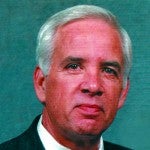Renowned journalist, Clanton native Davis passes
Published 8:02 pm Tuesday, September 25, 2012
Advocate for the less fortunate. Advocate for the truth. Storyteller. Journalist. Beloved boss. Friend.
Those who knew Paul Davis best described him as a jovial, pit bull of a journalist who exposed wrongdoing, and fought to correct it for the betterment of all – even if the words he penned touched your nerves.
Davis, 74, who was born in Clanton, passed away late Sunday evening at his Auburn home after a short illness. He was owner/publisher of the Auburn Bulletin and Tuskegee News from 1983 until 1998, and worked as a veteran columnist for the Opelika-Auburn News through 2009. Davis was nominated for a Pulitzer Prize and is a recipient of the Alabama Press Association Lifetime Achievement Award.
But Davis was not known by his professional titles. He was known by his professional work. No issue was too small. No opponent was too powerful.
Locally, Davis is noted for rooting out perceived corruption at Auburn University through his weekly columns. But perhaps his greatest work came years ago in Tuscaloosa.
Davis worked as a medical reporter for the Tuscaloosa News and repeatedly published articles in the late 1960s and early 1970s chronicling negligence at Partlow State School and Bryce Hospital, both for the mentally disabled. Davis’ work went beyond the byline.
“That led to a lawsuit (Wyatt v. Stickney) that changed the way facilities treated people with mental disabilities,” said Bill Keller, former president of the Alabama Press Association. “The decision came down that you could not confine someone unless they were a danger to themselves or others.”
In 1972, U.S. District Court Judge Frank Johnson ruled that mental patients had a constitutional right to treatment.
“With Paul’s death, I have lost a trusted friend of more than 40 years,” said U.S. Sen. Richard Shelby, R-Birmingham, who served as the city of Tuscaloosa’s prosecutor during Davis’ tenure at the Tuscaloosa News. “He was an outstanding writer, investigative reporter, and editor who always crusaded for what he believed was right. Above all, Paul was a man of the highest integrity. We will all miss him. My thoughts are with his wife, Gayle, and the rest of his family during this difficult time.”
Alabama Press Association President Felicia Mason noted that the medical community was Tuscaloosa’s largest employer with an estimated 10,000 beds.
For that, Davis was nominated for a Pulitzer Prize.
“He never shied away from controversy,” she said. “He never backed down just because it wasn’t popular or wasn’t the most comforting thing to talk about.”
People in Auburn found that out.
Davis didn’t back down from the powerful at Auburn University – taking stands against former and long-time trustee Bobby Lowder, former trustee and senator Lowell Barron, and recording former Auburn University football coach Terry Bowden admitting to a pay-for-play scheme during Bowden’s first season on the Plains.
Auburn was placed on probationary status by the Southern Association of Colleges and Schools in 2004, and its accreditation status was in jeopardy.
In a 2004 column in the Opelika-Auburn News, Davis wrote, “I can tell the university, its trustees and the governor to get Auburn off probation. It’s rather simple. Get rid of Ed Richardson (president), Bobby Lowder, Jimmy Rane (trustee), Jack Miller (trustee), Paul Spina (trustee) and Byron Franklin (trustee).
“Now that isn’t hard, is it?”
Keller told the Opelika-Auburn News on Friday that Davis was trying to help the university.
“I knew him when he was running the Bulletin and he took some pretty controversial stands,” Keller said. “He was trying to help the university deal with (former trustee) Bobby Lowder. He saw things he thought that shouldn’t be going on. His work helped create a better situation at Auburn.
“Auburn went through a black period (SACS accreditation in 2003-04). He was very much involved in focusing attention on the university’s governing body and how board members overstepped their boundaries and that one board member doesn’t have to be more powerful than other board members. There was too much power in the hands of one board member.”
Stan Voit, editor of the Auburn Bulletin from 1987-96, said when Davis pursued a story, he wouldn’t let go.
“He was an advocate of advocacy journalism,” Voit, now editor of the Mountain Press in Sevierville, Tenn., said. “He was always objective — and he knew what he wanted. He spent time developing his sources and that confirmed what he already suspected.”
Visitation was Tuesday from 6 to 8 p.m. at Jeffcoat-Trant Funeral Home in Opelika. Funeral will be Wednesday at 2 p.m. at Auburn Church of Christ on South College Street.







